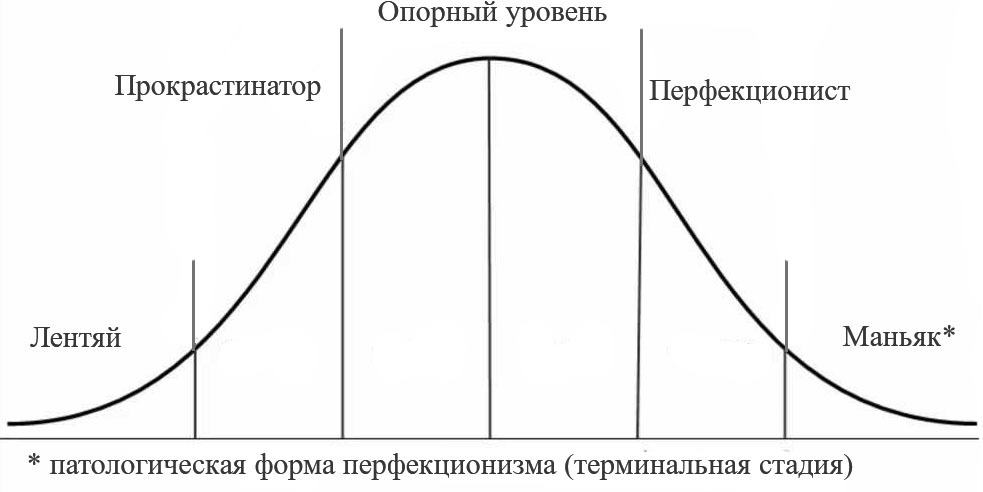Why procrastinators procrastinate, perfectionists catch fleas, lazy people do nothing and how to make everyone work

After the publication of the article “Laziness as a sign of genius. 4 types of laziness and whether it is necessary to fight it ”on the Megamind there were some very interesting, but sometimes contradictory articles about procrastination. I also wanted to write an article about procrastination, but in order not to completely destroy the brain of our dear reader, I decided instead to generalize the materials and dig a little deeper, give some analytics, where does laziness, procrastination and perfectionism come from (new!), And whether one go into the other. Those who have not read previous articles will be able to get a complete picture of these problems in this article in order to be in trend. I hope this article will be a good conclusion to the “week of procrastination on the Megamind” and will be most helpful in solving these difficult tasks.
To avoid confusion in the presentation of the material, let's start with a few definitions:
Laziness (from the Latin. Lenus - calm, slow, sluggish) - reluctant to work, aversion from work, from work, from work, as an inclination towards idleness, idleness;
Perfectionism (from fr. Perfection - perfection) - the conviction that the best result can (or should) be achieved. In the pathological form - the belief that the imperfect result of the work is unacceptable.
Procrastination (from lat. Pro - instead of, ahead and crastinus - tomorrow) - a tendency to constantly postpone “for later” unpleasant things.
')
Laziness
If we classify laziness by the sources of its occurrence, then we can distinguish 4 types of laziness:
- Laziness as a lack of motivation for not understanding your purpose
- Laziness as a defense mechanism that prevents the fulfillment of a meaningless, useless task
- Laziness as a sign of genius
- Laziness as an external manifestation of fatigue
Methods of diagnosis and treatment are described in detail in the article “Laziness as a sign of genius. 4 types of laziness and whether to deal with it . "
With a certain motivation, laziness can turn into “effective work,” if the employee is smart and lazy, or into procrastination with other options.
General advice I will give only one:

Perfectionism
The famous American psychoanalyst, Karen Horney, argued that perfectionism is an integral part of the “idealized image.” A person may have excessive demands on himself and others, and the conviction that everything in the world should be perfect.
Benefits: the work will be done perfectly
Disadvantages:
- at least 1.5–2 times more resources, including temporary resources, would be spent on work performance than could be spent to achieve an “optimal” result.
- when performing small tasks and assignments, it significantly slows down the work of the whole project.
- prone to various diseases.
What a perfectionist hurts:
- Analytical paralysis — the perfectionist prepares himself so thoroughly for the task ahead that he may never proceed to the task itself.
- Micromanagement - attempts to control all actions of subordinates, explaining to them how to perform the assigned tasks (from his point of view).
- Type 2 procrastination - postponing decision making until enough information is gathered for an “objective decision making”.

A fragment of the cartoon "The Hare, who loved to give advice." A good example of micromanagement.
How to treat perfectionism?
Perfectionism is treated very hard, long-term therapy is shown under conditions of a serious limitation of the available amount of resources. When the perfectionist sees that if the work is not done perfectly (10 points out of 10), but 9 points, but 2 times faster, he gradually begins to understand the value of time.

Graph of the normal distribution of a random variable.
Explanation of the schedule. The easiest way to do work in the range of 1 sigma (68%). In order to get closer to the result of 95% (2 sigma), you need to apply 10-15 times more effort. To achieve a result of 99.7% (3 sigma), you need to spend 30 times more effort.
With prolonged treatment may experience a side effect - procrastination.
Robert Slaney (Pennsylvania State University) et al. Highlight the so-called adaptive perfectionists, who do not consider their perfectionism to be a serious problem, such less prone to procrastination, and non-adaptive perfectionists, in which perfectionism leads to stress, depression, they show a high level of procrastination.
Procrastination
Evgeny Ilyin in the book “Work and Personality. Workaholism, perfectionism, laziness ”writes: Procrastination is explained by the presence of a number of subjective reasons in a person: indecision, fear of failure and disapproval from others, self-doubt, perfectionism. In this regard, isolated intense procrastinators. However, there are relaxed procrastinators, corresponding to the everyday understanding of laziness.
N. Milgram et al. Distinguish two types of procrastination: postponing the fulfillment of tasks and postponing decision making.
Tense procrastinators invite you to read the article "Why we do not achieve the goals we set . " There are symptoms of the above emotional obstacles and options for their treatment.
Relaxed procrastinators have their own characteristics that need to be considered when working with them. They focus on doing things that give pleasure here and now. If we turn to the theory of generations (I will definitely write an article about it later), then this approach is peculiar to the first generation Y (the other name is Millennium, Next), which were born from 1984 to 2000. Their core values are freedom, entertainment, results. They have grown confident in their own values and this must be taken into account when working with them. About relaxed procrastinators very well written in the article "How we earn procrastination . " The author is very respectful.

An extreme form of procrastination.
So, we have seen that there are three different ways to reduce performance.
Laziness - the work just stands still.
Perfectionism - the work will be done, but with a deadline or using a large amount of resources.
Procrastination - the work will be done tomorrow.
Congratulations to those who could read up to this point. You are great!
The most persistent I propose to reflect on the deep motives of these phenomena.
Reference level
Josh Kaufman in his book "Myself MBA" offers an interesting concept:
At the heart of each perceptual control system is a reference level - the range of perception, which signals that the system is “under control”. If the perception is within the reference level, then the system is inactive. As soon as it goes beyond its scope, the system takes certain steps to restore balance.
So, each individual has his own reference level. If I have the standards to wash dishes 2 times a day, then the one who washes the dishes every time after eating is a perfectionist, and the one who leaves everything until the evening or until the morning is a procrastinator or a lazy person.

Summary
Instead of a conclusion, I propose to consider what the above described features of the behavior of the boss and subordinate result in (this concept was proposed by the author of the article, published for the first time). It describes the influence of the boss on his surroundings and what this could potentially lead to.

I like one phrase very much, unfortunately I don’t remember the author:
The chief must teach you, and if he does not teach, why do you need such a boss.
In this regard, the greatest progress is possible when the chief is a perfectionist, and an employee is a procrastinator or a lazy man. Such a tandem is the best therapy for the employee. This is a way out of the comfort zone if you want to become a good specialist. It is clear that as a result, an employee having obtained the necessary competencies and having learned to do his job efficiently, will most likely become a procrastinator, here I agree with the author of the article “How to make procrastination”. At the same time, he will do his work quickly and efficiently, so as not to redo it later.
As for the question to treat or not to treat? It is up to you. I know many examples where many idlers, procrastinators and perfectionists work in a team, they work quite successfully / imitate and receive regular wages. Are you ready to pay money for inefficient work?
I hope you enjoyed it. I invite you to discuss.
Source: https://habr.com/ru/post/300632/
All Articles